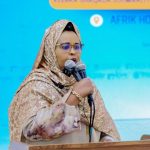Somalia has applied for membership to the East African Community (EAC), a seven-nation bloc that includes Tanzania, Kenya, Burundi, Rwanda, South Sudan, and Uganda. The EAC delegation visited Somalia in January to assess the country’s readiness to become a member state. Somalia’s President, Hassan Sheikh Mohamud, has called for quick admission, stating that EAC membership would be beneficial in terms of increasing the movement of goods, services, and people, expanding intra-regional trade, and boosting the regional economy. However, Somalia also faces significant challenges, including food insecurity and the threat of Islamist violence. This article will examine the potential advantages and challenges of Somalia’s admission to the EAC.
Somalia’s potential membership in the East African Community (EAC) has been a long time coming. In late January, a mission from the seven-nation bloc, which includes the Democratic Republic of Congo (DRC), Tanzania, Kenya, Burundi, Rwanda, South Sudan, and Uganda, travelled to Somalia to assess its readiness to become the latest member state.
Somalia is well known for its innovative business ideas and entrepreneurial spirit in the region, making it a valuable addition to the EAC. With its unique business culture, Somalia offers a mouth-watering market for the population of East Africa. However, Somalia faces challenges in the shortage of skilled labor, while other East African member states have a surplus of skilled labor and high unemployment rates. Therefore, Somalia could benefit greatly from the knowledge and expertise of its fellow East African countries.
If accepted as a member, Somalia could benefit significantly from the increased movement of goods, services, and people across the bloc, expanding intra-regional trade, and boosting the regional economy. Moreover, Somalia’s blue economy resources, such as fish, could be utilized to further enhance its economic potential.
EAC membership could also boost Somalia’s efforts to improve its multilateral and fiscal standing. Somalia is currently in the middle of an IMF program which has disbursed $393.2m to date, and this year hopes to complete the Heavily Indebted Poor Countries global debt forgiveness process, which could reduce debts to $550m from $5.2bn.
Despite these opportunities, Somalia faces significant challenges of regional significance. In its October-December 2022 projection, the Integrated Food Security Phase Classification reported that approximately 6.7m people across Somalia were likely to experience high levels of acute food insecurity, including over 300,000 likely to face famine. The crisis is exacerbated by a punishing drought, the impact of the Russia-Ukraine war, and Somalia’s vulnerability to climate shocks. Meanwhile, the danger of Islamist violence is ever-present – on 29 October, over 100 civilians were killed in an attack on the Ministry of Education.
Against this backdrop, EAC membership could prove useful. As well as amplifying the voice of its member states on a global level, the EAC offers a crucial regional forum for working collaboratively on Somalia’s challenges and formulating solutions with its leaders.
The EAC is not without its own pressing challenges, with member states such as DRC and Rwanda appearing to be in danger of direct armed confrontation amid the ongoing M23 rebel insurgency in the eastern DRC, which Kinshasa, the US, and UN experts say is backed by Rwanda. However, the EAC has been a voice of moderation, calling for armed groups in eastern DRC to lay down their arms while reiterating respect for the territorial integrity of the DRC.
If Somalia becomes a member, the EAC would benefit from Somalia’s unique strengths, such as its vast fertile land, which could be used to boost its agricultural sector and improve food security for its people.
Before 2026, the bloc is aiming for full implementation of a single customs territory, progress on its plans for a common market – including free movement of goods, people, labor, services, and capital – and more controversially, plans for a single regional currency. It is also on a mission to expand. In April 2022, the DRC formally joined, massively boosting the EAC’s geographic reach and adding over 95m people to the bloc.
Overall, becoming a member of the East African Community presents an exciting opportunity for Somalia to address its challenges and tap into the potential of the region. Joining the EAC offers an opportunity for Somalia to collaborate and learn from its neighbors while contributing its own strengths and resources to the bloc.




